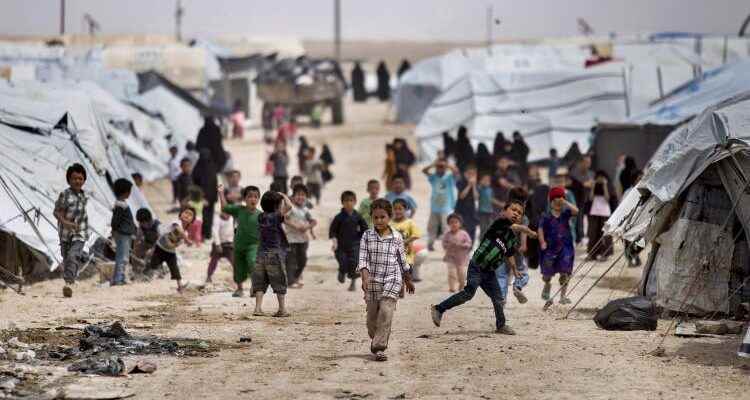Al Hol Camp is becoming a lawless place. Every day there is extortion and murder. In addition to IS supporters, thousands of civilians live there with their children. You compare the camp to Guantánamo.
Not a suitable place for children: In the Al-Hol camp there are few prospects and a lot of violence.
In mid-November, the bodies of two girls were found in the Al-Hol camp. They lay beheaded in the sewer. The roughly 11 and 13 year olds are no exception. Children are repeatedly murdered in camps in north-eastern Syria without ever having seen much but their tent and too much violence.
«Al-Hol is the most dangerous place in the world. Four months ago I was walking with a friend at sunrise and we saw a shawl. A corpse was wrapped. We didn’t do anything because we’re too scared of the security forces.” This is what an inmate of the camp tells in a new report by the aid organization Doctors Without Borders (MSF), which provides a detailed insight into the lives of around 55,000 people in the camp.
The camp is more diverse than its reputation
Two-thirds of al-Hol’s inmates are children, with the remainder mostly women. The camp has received special attention since the Islamic State terrorist militia was crushed. Back then, in 2019, tens of thousands fled to the camp from other parts of north-eastern Syria, many of them belonging to jihadist families or having previously lived under IS.
The Al Hol camp has a reputation for being full of IS supporters, but the reality is more diverse. 11,000 IS members and their children are housed in a separate and highly secured part. Some residents of the rest of the camp sympathize with them, but many reject the extremist ideology.
Since 2019, the residents have been virtually locked in. The camp is surrounded by barbed wire fences, there are deep trenches and several Syrian Democratic Forces (SDF) checkpoints that control the camp. MSF writes that people are only allowed out with a special permit, which is rarely granted. The procedure for being allowed to move out of the tent city is complicated and opaque.
“Sometimes they kill for no reason”
People talk about everyday life shaped by fear and violence. Almost everyone in the camp knows someone who has lost a loved one. Armed groups blackmail the residents, and those who don’t pay them money can be dead the next day. Sometimes IS supporters assassinate those who deviate too much from their doctrine. Often, however, the violence is arbitrary.
“We don’t know why they murder people and we can’t lock our doors – we don’t even have doors! They say they only kill people who spy for the security forces. But sometimes they kill for absolutely no reason,” says one person in the report.
The camp management does not protect threatened people enough. Within the camp there is a separate area for people who are particularly at risk. But in November 2021, men broke into the protection zone and shot two people. The procedure of the UN refugee agency, which is supposed to bring out persecuted people, is often too slow, writes MSF. Some people pay smugglers to get out of the camp.
“We are losing a generation here”
In this environment, mothers are torn: either they keep their children with them in the tent, but then they hardly have any social contact. Or they let them out to play and risk coming home injured in the evening. “In the case of sexual assault, the mother is considered the culprit. They say: You should have taken better care of your children, »says a woman.
“We are losing a generation here,” say several in the camp. Everything is missing: education, work, medicine. If a child has to go to a hospital outside the camp, it is often not allowed to accompany the mother for safety reasons. MSF knows of cases where children have died alone in hospital.
States like Guantanamo
“If I had known that, I would have died rather than come here,” says a mother who lives in the normal part of the camp. Another compares the camp to Guantánamo. Many felt as if they had been found guilty without a trial, MSF writes.
Al-Hol is like a legal vacuum. Violence goes unpunished. Security forces are not investigating crimes and are making arbitrary arrests, residents say. During that year, the security forces carried out numerous raids against suspected IS cells in the camp.
People who had to go to the camp’s prison tell of beatings and rapes in the MSF report. Some report being locked in a toilet for several months.
Turkey attacks camps
The camp is not only an ideal place for radicalization of children, but also a danger for the whole region. How fragile the situation is became apparent on Wednesday. According to an SDF spokesman several Turkish airstrikes hit security posts guarding the camp. Some IS members could have fled, but were later arrested again.
Most of the camp is Syrian and Iraqi, but there are people from 60 different countries. The Kurdish autonomous administration in north-eastern Syria has been pushing for years for the home states to take back their citizens.
Iraq has repatriated a few thousand but does not want the most dangerous jihadists back. Many European countries also refuse to take IS members back, especially since it is often difficult to bring them to justice due to a lack of evidence. The camp remains a ticking time bomb.
